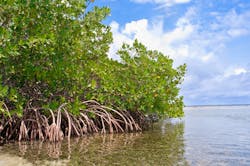New nature-inspired membrane could slash water purification costs
SINGAPORE — Dec. 9, 2015 — Researchers at the National University of Singapore have developed new technology that could reduce water purification costs by up to 30 percent, according to a press release.
The novel biomimetic membrane can purify water at low pressure, reducing energy costs. It also exhibits high mechanical strength and stability during the water filtration process, making it suitable for industrial applications in water treatment and desalination, noted the release.
According to the university, the new membrane was inspired by the natural water purification systems of the mangrove plant and the human kidney, stated the release. It incorporates aquaporins — membrane proteins that selectively conduct water molecules in and out of cells, preventing the passage of ions and other solutes.
With the presence of aquaporin, the mangrove plant is able to filter between 90 and 95 percent of the salt at its roots, while the human kidney is able to purify up to 150 litres of water daily, reported the release.
“The biomimetic membrane is constructed to mimic the layers of cells on the roots of mangrove trees,” explained Associate Professor Tong Yen Wah from the National University of Singapore in the release. It does this by “embedding nano-sized aquaporin-vesicles onto a stable and functional ultrafiltration substrate membrane using an innovative yet simple and easy-to-implement surface imprinting technology.”
The resulting aquaporin-incorporated biomimetic membrane allows water to pass through it faster and also has lower salt leakage than a membrane without aquaporin, Tong said in the release.
You can find the entire release here.
